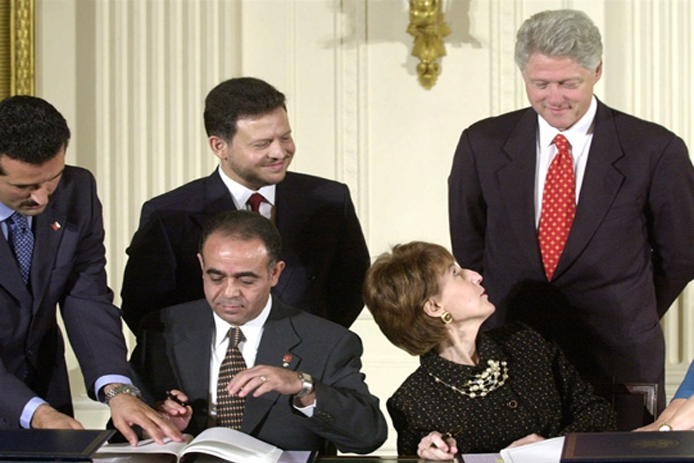
The U.S.-Jordan Free Trade Agreement (FTA), signed on October 24, 2000 and entered into force on December 17, 2001. Jordan and the U.S. also have a Bilateral Investment Treaty. These agreements provide Jordanian exports with a comparative advantage in the large U.S. market and helps boost foreign direct investment from the United States.
At the time, it was the first U.S. FTA with an Arab country. Currently the U.S. also has FTAs with Bahrain, Morocco and Oman, which came as part of the U.S. Middle East Free Trade Area Initiative (MEFTA initiative) first proposed in May 2007. The MEFTA initiative “is a plan of graduated steps for Middle Eastern nations to increase trade and investment with the United States and with others in the world economy, with the eventual goal of a regional free trade agreement.

President Clinton and King Abdullah II signed the JUSFTA on October 24, 2000.
Source: SUSAN A. WALSH/AP
| Side by Side Comparison of U.S. FTA with Arab Courtiers: | ||||
| Provisions | Jordan | Bahrain | Morocco | Oman |
| Implementation Date | December 17, 2001 | August 1, 2006 | January 1, 2006 | January 1, 2009 |
| Expiration | None | None | None | None |
| Duty Phase-Out | January 1, 2010 (10 years) | January 1, 2015 (10 years) | January 1, 2023 (18 years) | January 1, 2018 (10 years) |
| Merchandise Processing Fee(MPF) | Not exempted | Exempt for originating goods; 19 Code of Federal Regulation (CFR) 24.23(c)(9) | Not Exempt | Exempt for originating goods; 19 Code of Federal Regulation (CFR) 24.23(c)(11) |
| Direct Shipment Imported Directly Transit & Transshipment Third Country Transportation | Imported Directly: May NOT enter the commerce of a 3rd country except for non-retail sale where the importation is the result of the original transaction, may not undergo further production in a 3rd country; GN 18(c)(vi); 19 CFR 10.711 | Imported Directly: May leave customs’ control, may not undergo further production in a 3rd country, limited operations specified; GN 30(d)(v); 19 CFR 10.817 | Imported Directly: May leave customs’ control, may not undergo further production in a 3rd country, limited operations specified; GN 27(d)(v); 19 CFR 10.777 | Imported Directly: May leave customs’ control, may not undergo further production in a 3rd country; GN 31(d)(v); 19 CFR 10.880 |
| Primary Responsibility for Compliance | Importer | Importer | Importer | Importer |
| Rule of Origin citation | General Note 18(b) 19 CFR 10.709, 10.710 | General Note 30(b) 19 CFR 10.810 | General Note 27(b) 19 CFR 10.770 | General Note 31(b) 19 CFR 10.873 |
| Rule of Origin | “Wholly the growth, product, or manufacture” or Value Content + Substantial Transformation | “Wholly the growth, product, or manufacture” or Value Content + 19 CFR 102 or Product-Specific Tariff shift | “Wholly the growth, product, or manufacture” or Value Content + 19 CFR 102 or Product-Specific Tariff shift | “Wholly the growth, product, or manufacture” or Value Content + Substantial Transformation or Product-Specific Tariff shift |
United States has 14 FTAs in force with 20 countries. U.S. FTA Partner Countries: Australia; Bahrain; Chile; Colombia; DR-CAFTA: Costa Rica, Dominican Republic, El Salvador, Guatemala, Honduras, & Nicaragua; Israel; Jordan; Korea; Morocco; NAFTA: Canada & Mexico; Oman; Panama; Peru; and Singapore.
Promoting trade is a key aspect of Jordan’s economic development policy. The Jordan U.S. FTA represents a milestone in the development of Jordan’s trade policy. Jordan has been a member of WTO since 11 April 2000, and has signed multiple bilateral and multilateral FTAs with its major trading partners.